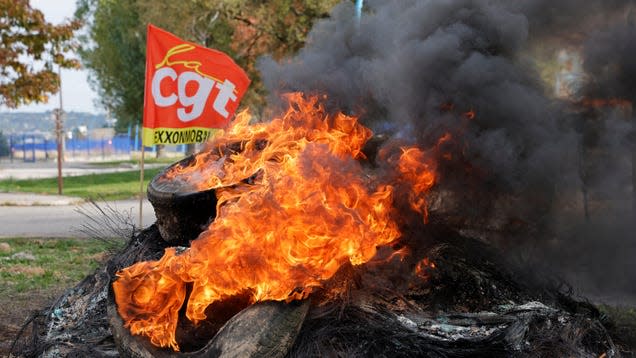France flexes the law’s muscles as oil workers’ strike enters a third week

The French government has so far kept its nose out of the labor crisis brewing at its oil refineries—but it’s now stepping in with a hardline measure.
On Tuesday (Oct. 11), the government said it would force a number of Esso-ExxonMobil fuel workers back to their plants as parts of the country ran out of fuel. “I’ve asked police commissioners to begin, as the law permits, the requisition of personnel essential to this company’s facilities,” prime minister Élisabeth Borne told lawmakers, quoted by Politico.
Read more
The move comes after Exxon’s French business, Esso France, reached an agreement with two unions who called off their strikes, but hard left union General Confederation of Labor (Confédération générale du travail, or CGT), which represents over 690,000 workers, rejected the deal.
Refinery workers across the country have been striking for three weeks now, demanding 10% pay raises amid rising inflation and oil majors clocking record profits.
Brief history
Sept. 20: Unions CGT and Force Ouvriere (FO) called a strike following wage negotiations with ExxonMobil.
Sept. 24: ExxonMobil completes shutdowns of its 240,000 barrel per day (bpd) Port Jerome-Gravenchon oil refinery, the Notre Dame de Gravenchon Petrochemical site, and the 140,000 bpd Fos-Sur-Mer refinery.
Sept. 27: Strikes begin at five TotalEnergies’ French refineries and one fuel storage depot.
Sept. 28: TotalEnergies halts production at its 240,000 bpd Gonfreville refinery. Stocks don’t move at its other sites either.
Oct. 9: Esso France reaches an agreement with two unions to hike salaries by 6.5% in 2023. and give a 3,000 euro ($2,916) bonus. The terms amount to an overall wage increase of 10.7% plus 4,000 euros in bonuses from Jan. 1, 2022, to Dec. 31, 2023. CGT rejects the deal.
Oct. 10: CGT rejects TotalEnergies’ offer to advance wage talks from the scheduled mid-November date only if protests end, calling it “blackmail.”
Fighting fuel shortages amid strikes
France has resorted to different strategies to make do with the fuel shortages so far, which are compounded by a drop in nuclear energy production due to more than half of the country’s plants being offline—and maintenance work is also being affected by strikes.
🛢️ Tapping into strategic fuel reserves to resupply petrol stations and avoid sugar factory stoppages
✈️ Importing more oil, with the largest share—24%—coming from India
🙅♂️ Disallowing panic buying and hoarding. (In the Hauts-de-France region, authorities banned the sale of petrol and diesel in jerry cans and other portable containers.)
🩺 Putting essential workers front-of-line. (In the city of Lille, some petrol stations were asked to ensure that health emergency workers were given priority)
How can France force striking staff back to work?
The right to strike is a constitutional one, but it can be regulated. As per the local authorities law, local prefects can “requisition any property or service, require any person necessary” to maintain public order, hygiene, tranquility and safety.
Police could go door-to-door and demand people come back to work. Those who refuse are looking at €10,000 ($9,700) in fines or six months jail time.
There’s a precedent for Borne’s decision. In October 2010, nationwide strikes against president Nicolas Sarkozy’s pension cuts paralysed France’s oil refining industry with 12 refineries grinding to a halt. Then-prime minister Francois Fillon’s used requisition orders to bring back TotalEnergies’ refinery staff back to work.
It didn’t last too long. A judge suspended the order, saying requisitioning 170 employees—almost the entire workforce—represented a “serious and manifestly illegal infringement of the right to strike.”
Only a small number of workers—fewer than 10—are needed to run essential operations.
Quotable
“The government wants to force us to come to work, we’re going to fight against that, it’s clearly an infringement of the right to strike. We’re being directly attacked on our right to strike.” —Christophe Aubert, CGT delegate at ExxonMobil
By the digits
60%: how much France’s total refinery output has been reduced by in the past two weeks; equivalent to 740,000 barrels per day
70%: share of refinery workers participating in the strikes
10%: wage hike CGT is demanding; 7% to combat inflation and 3% “profit sharing”
3.5%: average salary raises by TotalEnergies at the start of this year, with negotiations planned for November
70%: spike in French diesel imports so far in October amid strikes, compared with all of September
30%: France’s petrol stations experiencing a shortage of one or more fuels
3,500: TotalEnergies’ petrol station network in France
60 million barrels: diesel inventory in June; 15 million less than the 5-year-average for the same period
90: days fuel stock will last
2 weeks: time it’ll take for the fuel situation to return to normal once access to refineries and depots is free
Could requisition orders light a bigger fire?
Undeterred by, or perhaps even irked by, the government’s warning, workers voted to keep protesting.
The CGT plans to challenge in court the upcoming government requisition notifications concerning staff at ExxonMobil’s Gravenchon-Port Jerome petrol depot in Normandy.
Yesterday (Oct. 11), Emmanuel Lépine, secretary general of the CGT Professional Oil Federation, which represents Esso and Total gas stations, told French public radio Franceinfo that “it would be war” if the government tried to requisition employees.
Related stories
👨💼 The number of strikes are increasing for US workers
⚡ Power-hungry Europe is leaving developing countries starving for electricity

